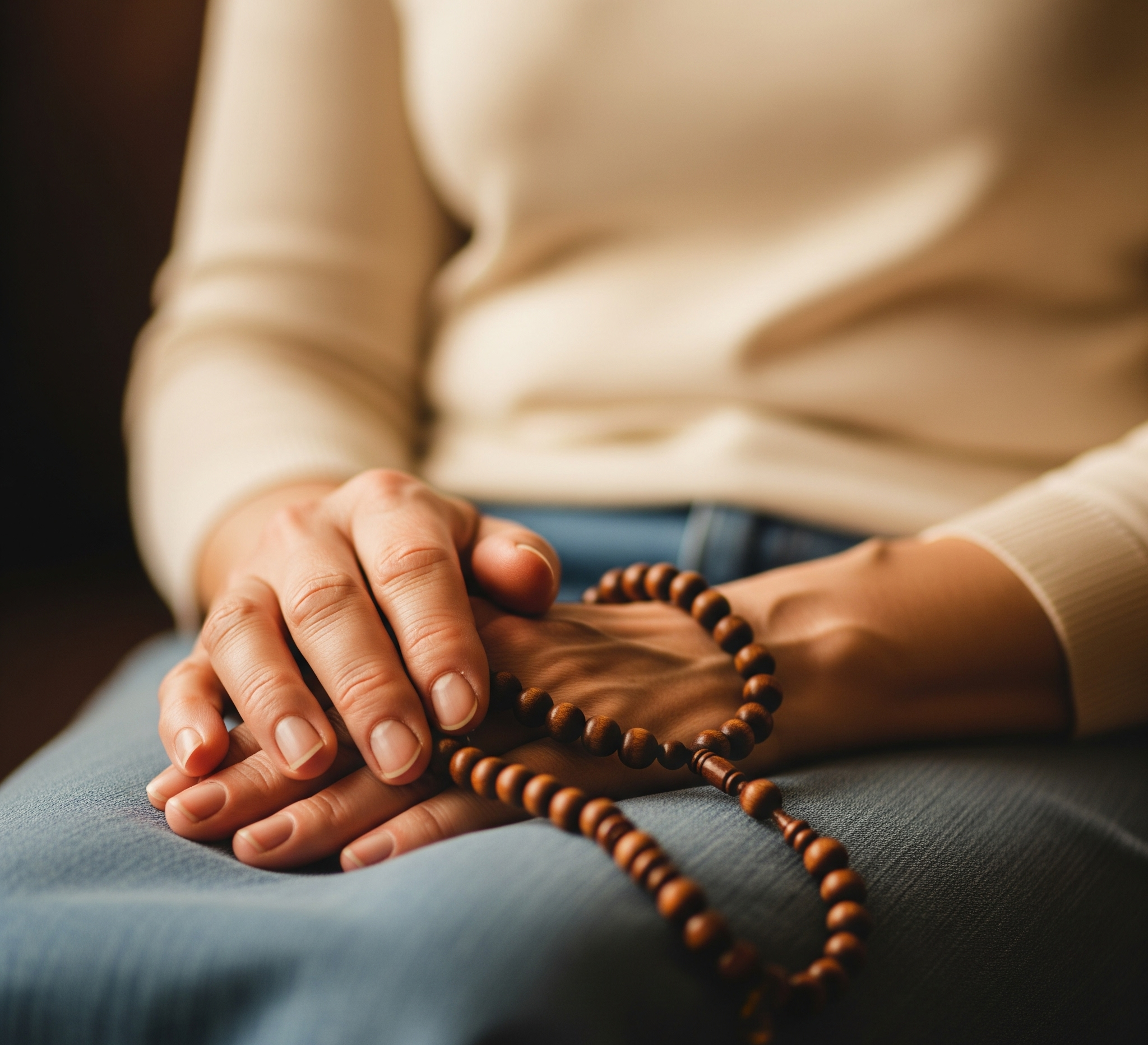I can still feel the profound silence of that Adoration chapel. The air was thick with reverence, the golden monstrance gleamed, and the only sound was the gentle hum of the ventilation. Everyone else seemed so… still. So holy. Their eyes were closed, their faces serene. They were clearly locked in a deep, intimate conversation with Jesus.
And me? My mind was a category-five hurricane.
Did I remember to move the laundry over? I need to pick up milk on the way home. Oh, that email I have to send tomorrow… wait, what was I thinking about? Oh right, prayer. Okay, focus. Jesus, I’m here. I love you. Gosh, my knee is starting to ache. I wonder if I have any ibuprofen at home. Shoot, stop it! Just be present!
I felt like a complete fraud. I wanted so badly to be still, to be present, but my mind was a runaway train. I left that chapel feeling more dejected than peaceful, convinced I was a failure at the one thing that was supposed to connect me to God: prayer.
If that feeling is at all familiar to you, take a deep, mindful breath. Because I’ve come to learn that this struggle isn't a sign of failure. In fact, it’s the perfect starting point.
"Lord, Teach Us to Pray"
For years, I thought I had to show up to prayer with my spiritual life perfectly in order. I thought I needed to have the right words, the right posture, and a mind clear of all distraction. But then I found myself sitting with a familiar passage from the Gospel of Luke, and it felt like a key unlocking a door in my heart.
The scene is simple: The disciples see Jesus praying, and when He is finished, one of them says, "Lord, teach us to pray" (Luke 11:1).
Let that sink in. These are the men who walked with Jesus every single day. They saw His miracles, they heard His preaching firsthand, and even they had to admit they didn't know how to do it. They had to ask for help.
In that one, simple request, they give us the most profound permission slip. They give us permission to be beginners. In the world of mindfulness, this is called having a "beginner's mind"—letting go of our expertise and our ego, and approaching something with fresh, curious, and humble eyes.
Admitting "I don't know how" is not a failure; it's the most honest prayer we can offer. It’s the humble recognition that prayer is not a technique we master, but a relationship we receive. When we can finally stop pretending we have it all together and just say, "Lord, my mind is a mess. Please, teach me," we are in the most receptive posture possible.
The Call to Be Shamelessly Persistent
What Jesus does next is fascinating. After giving them the beautiful words of the "Our Father," He tells them a story about a man banging on his friend's door at midnight, asking for bread. The friend eventually gets up, not because he’s a good friend, but because of the man’s "shameless persistence."
For a long time, I thought this meant I had to annoy God into listening to me. But that’s not it at all. This isn't about wearing God down. It's about our own disposition.
"Shameless persistence" is about being so rooted in the trust of a relationship that you're not afraid to be messy. You’re not afraid to show up at midnight with nothing. You’re not afraid to keep knocking when you feel nothing but silence. You’re not embarrassed by your wandering mind or your clumsy words. You just keep showing up.
This is where our prayer life and the practice of mindfulness beautifully intersect.
When you practice mindful breathing, the instruction isn't to never get distracted. That’s impossible. The instruction is to simply notice when your mind has wandered, and then, without judgment, gently return your focus to the breath.
This is the very essence of shameless persistence in prayer.
Your mind wanders to the grocery list. Notice. Gently return to Jesus.
You get lost in a worry about the future. Notice. Gently return to Jesus.
You start feeling bored, antsy, or like a fraud. Notice. Without judgment, gently return to Jesus.
This is the "ask, seek, knock" of the interior life. Every gentle return is a knock. Every humble admission of distraction is a seeking. Every breath offered back to Him is an asking. It's a trusting, moment-by-moment dialogue that says, "I'm still here. I'm still trying. Teach me."
Prayer is not about achieving a perfect state of Zen-like calm. It is about the persistent, loving, and shameless returning to the One who is always waiting for us, even and especially when our minds feel like a hurricane.
So next time you sit down to pray and your mind starts making a to-do list, don't despair. Smile. You're in good company. Take a breath, and with all the humility of a beloved disciple, just whisper, "Lord, teach me to pray." He will be so glad you asked.



